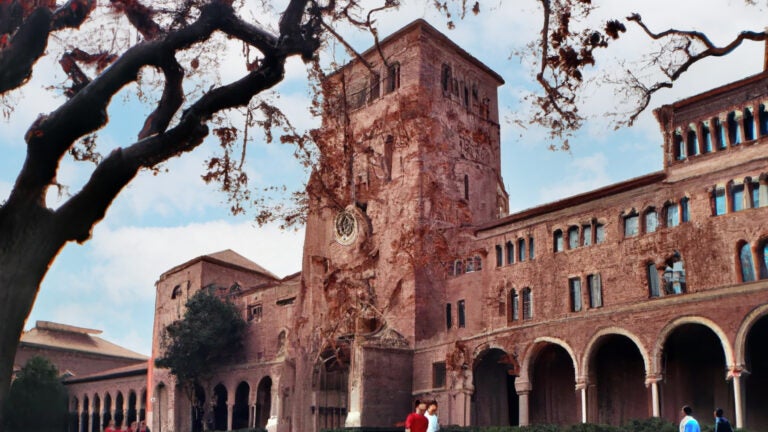
The new Center for Generative AI and Society reinforces USC’s historic influence on computing and its reputation for nurturing generations of engineers, entrepreneurs, innovators and scientists.(Image/Generated with the assistance of the DALL-E 2 AI system)
USC dives into AI research, education with new Center for Generative AI and Society
With the growing interest in generative AI tools like ChatGPT, USC forms a research center with $10 million in seed money and influential experts from the fields of computer science, film, media, education and more
Contact: Paul McQuiston at paulmcq@usc.edu or (323) 527-7770
USC President Carol Folt is announcing a new Center for Generative AI and Society to explore the transformative impact of artificial intelligence on culture, education, media and society.
The new $10 million center will fund research, convene experts and expand the university’s national leadership with a special focus on the ethical use and innovation of generative AI.
“USC is uniquely positioned to understand and influence how this emerging technology is changing the ways we live, work, and play,” Folt said. “Our 22 schools are longstanding leaders in fields like the creative arts, media, health, education, engineering, and business. Working across disciplines, USC will vigorously explore the intersection of ethics and the use and evolution of Generative AI.”
The center reinforces USC’s historic influence on computing and its reputation for nurturing generations of engineers, entrepreneurs, scientists and artists. The center’s opening comes amid the buzz over generative AI technology such as OpenAI’s ChatGPT and DALL-E, one of which launched with the research and aid of USC alumni.
Generative AI has the potential to revolutionize a variety of industries such as cinema, gaming, journalism, education, and even the next generation of drug therapies. The center aims to prepare students for the jobs of tomorrow.
“The genie is out of the bottle, and we’re not going back,” said Ishwar K. Puri, senior vice president of research and innovation. “Our students are going to use this technology, and we need to teach them how to use it responsibly. We want to harness the power of AI for the public good.”
In addition, the center will involve:
- A core group of leaders and faculty from five USC schools: Annenberg School for Communication and Journalism, Rossier School of Education, School of Cinematic Arts, Iovine and Young Academy and the Viterbi School of Engineering.
- Experts who will explore themes across industry sectors and professions, advance generative AI research and start new educational programs.
- A realm of influence that spans the arts, media, education, and beyond.
- Two co-directors. One is Holly Willis, a professor and chair of the media arts + practice divisions at the USC School of Cinematic Arts. The other is Bill Swartout, a computer science research professor at the USC Viterbi School of Engineering and chief technology officer for USC Viterbi’s Institute for Creative Technologies (ICT).
The center’s realm of influence will span the fields of arts, media, education, and beyond, with the potential to influence the economy, health care, law, medicine, policy, and science, said Ishwar K. Puri, senior vice president of research and innovation.
“We have a duty to develop solutions that are ethical and that benefit society as a whole,” Puri said. “This is an exciting time for USC, and we’re looking forward to working with our faculty and students to explore the possibilities of Generative AI.”
# # #
(Image/AI Generated Image)
Willow Bay, Dean of USC Annenberg School for Communication and Journalism

Elizabeth Daley, Dean of USC School of Cinematic Arts

Pedro Noguera, Dean of USC Rossier School of Education

Thanassis Rikakis, Dean of Iovine and Young Academy

Yannis Yortsos, Dean of USC Viterbi School of Engineering



